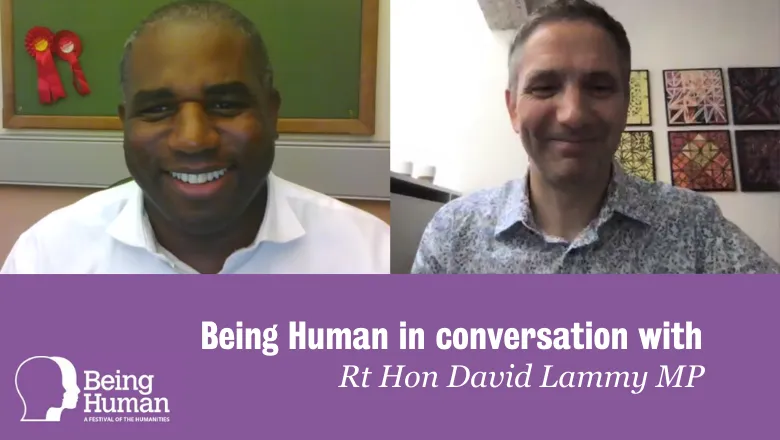I am absolutely a son of the humanities […] What the humanities does well is that minority groups are not left unseen or unheard, forgotten, left off or ignored. It is the humanities which help you learn the stories of Gandhi, Martin Luther King, Wollstonecraft, the Suffragettes and Black history – it's the humanities that help us."
David Lammy on the importance of the humanities during Q&A
01 July 2020
In conversation with David Lammy MP
Professor Nicholas Harrison
Professor Nicholas Harrison writes about his recent online discussion with Rt Hon David Lammy MP, who spoke about his transformative and sometimes uncomfortable experiences of education and the role of humanities curriculum in creating shared cultural experiences.

In my book, 'Our Civilizing Mission: The Lessons of Colonial Education' (2019) I looked into the stories of children who grew up under colonialism and were sent to colonial schools that were drastically different from their home environment. Especially in secondary schools, those students were often in a tiny minority, and their experiences were often difficult and painful, to say the least. I was interested in particular histories, of course, and a specific colonial context, but I also had in mind that those stories could be seen as an extreme example of an experience that is still quite common. For quite a lot of young people, education involves a growing sense of distance from their home background, and the experience can be alienating and painful even if they find it enriching in other ways.
All of this came to mind again when I was reading David Lammy's recent book 'Tribes: How Our Need to Belong Can Make or Break Society'. He writes about a significant turning point in his life when he was whisked away from his home in Tottenham to a state boarding school and a cathedral choir in Peterborough. He was the only black student and found himself in a very different world. "There can be real moments of peril as you leave behind the friends you grew up with and take advantage of opportunities in new environments that are foreign to you", he writes. "At times, I felt like I was losing my sense of who I was, who I was meant to be and which parts of myself I was meant to leave behind."
I approached him to suggest an online interview about his experiences of education, to take place under the umbrella of Being Human, the national festival of the humanities. In the interview on Wednesday 24 June, he began by talking about his experiences of racism at school – from some of the teachers, as well as from fellow students. The curriculum also sometimes made him feel out of place. One of the themes of Tribes is the importance of creating 'shared values' and 'shared cultural experiences', and humanities subjects can play a particular role there.
I'd have liked to examine some of the ideas of 'Englishness' that David explores in the book, and which he perhaps views more positively than I do, but as it turned out, that didn't come into our conversation. Instead, he emphasised the importance to him of some of the non-British literature he read at school, including To Kill a Mockingbird and the Australian novel Walkabout; and he also emphasised the importance today of studying colonial history in schools, and teaching people about African histories. I proposed this event before the new wave of Black Lives Matter activism, but by the time David and I met, these debates had a new momentum.
We ended up talking a bit more about the social function of education. David recognised that there was a tension between trying to create 'shared experiences' through schooling and having a huge diversity of schools in the UK, including faith schools, single-sex schools and private schools. I asked finally what his own experiences had taught him, in an era of growing inequality, about the relationship – or lack of relationship – between social mobility and social justice or equality. It has become harder, he said, to make the kind of journey he has made, which has a lot to do with the nature of our economy. As he said, there is a lot of talk about social mobility (and about the role of schools and universities in promoting social mobility), but the more fundamental questions are about social justice, about creating a fair society for all, and how to live a good life.
Professor Nicholas Harrison is a Professor of French and Postcolonial Studies at King's. His research and teaching interests include colonial/ postcolonial studies, North Africa and censorship. His book, 'Our Civilizing Mission: The Lessons of Colonial Education' centres around his research focusing on colonial education.

